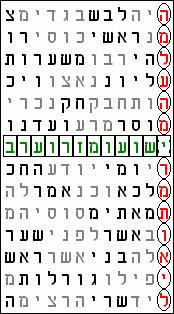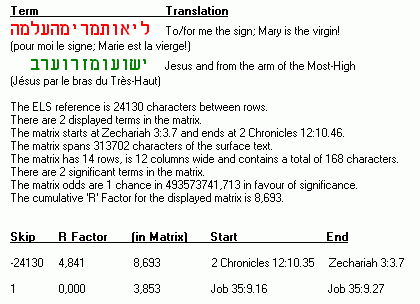
Code by Fab
For me the sign; Mary is the virgin!


A code
on the "Virgin Birth" inspired by a recent discussion with
a Jewish member. It is a theological doctrine which asserts that Jesus
was conceived in the womb of his mother, the Virgin Mary, without the
participation of a human father. It is a key doctrine of the Christian
faith (see further below why). The doctrine is based on a passage in
the nativity narrative of the Gospel of Luke, that Mary, the mother
of Jesus, was "overshadowed" by the Holy Spirit (Luke 1:35).
Other passages referring to it in the gospels:
Matthew 1:18: "Now the birth of Jesus Christ was on this
wise: When as his mother Mary was espoused to Joseph, before they came
together, she was found with child of the Holy Spirit.
19 Then Joseph her husband, being a just man, and not willing to make
her a publick example, was minded to put her away privily.
20 But while he thought on these things, behold, the angel of the Lord
appeared unto him in a dream, saying, Joseph, you son of David, fear
not to take unto you Mary your wife: for that which is conceived in
her is of the Holy Spirit.
21 And she shall bring forth a son, and you shall call his name JESUS:
for he shall save his people from their sins.
22 Now all this was done, that it might be fulfilled which was spoken
of the Lord by the prophet, saying,
23 Behold, a virgin shall be with child, and shall bring forth a son,
and they shall call his name Emmanuel, which being interpreted is, God
with us."
Luke 1:26: "And in the sixth month the angel Gabriel was
sent from God unto a city of Galilee, named Nazareth,
27 To a virgin espoused to a man whose name was Joseph, of the house
of David; and the virgin's name was Mary.
28 And the angel came in unto her, and said, Hail, you that are highly
favoured, the Lord is with you: blessed are you among women.
29 And when she saw him, she was troubled at his saying, and cast in
her mind what manner of salutation this should be.
30 And the angel said unto her, Fear not, Mary: for you have found favour
with God.
31 And, behold, you shall conceive in your womb, and bring forth a son,
and shall call his name JESUS.
32 He shall be great, and shall be called the Son of the Highest: and
the Lord God shall give unto him the throne of his father David:
33 And he shall reign over the house of Jacob for ever; and of his kingdom
there shall be no end.
34 Then said Mary unto the angel, How shall this be, seeing I know not
a man?
35 And the angel answered and said unto her, The Holy Spirit shall come
upon you, and the power of the Highest shall overshadow you: therefore
also that holy thing which shall be born of you shall be called the
Son of God.
36 And, behold, your cousin Elisabeth, she has also conceived a son
in her old age: and this is the sixth month with her, who was called
barren.
37 For with God nothing shall be impossible."
Matthew 1:23 connects the Virgin Birth to a prophecy found in Isaiah
7:14. There is a difference of interpretation between modern Jewish
commentators who generally reject this interpretation, and Christian
commentators who usually interpret it (in agreement with Matthew) as
referring to the Virgin Birth. Here is how the verse is translated in
the Christian and modern Jewish versions of the OT:
"Therefore the Lord Himself will give you a sign: Behold, the virgin
will be with child and bear a son, and she will call his name Immanuel."
Isaiah 7:14 in Christian versions.
"Therefore
the Lord Himself shall give you a sign: behold, the young woman shall
conceive, and bear a son, and shall call his name Immanuel." Isaiah
7:14 in Jewish versions.
The oldest Jewish translation in Greek of the OT uses the word "parthenos"
(i.e. a woman who never had sex with a man.
And
the Thayer's definition for parthenos:
G3933 parthenos
Thayer Definition:
A woman who has never had sexual intercourse with a man
Part of Speech: noun feminine
A Related Word by Thayer's/Strong's Number: of unknown origin
Citing in TDNT: 5:826, 786
Matthew was a Jew and was closer to the Jews who translated the Septuagint
(who was the version used to write or translate the NT in Greek), hence
the conclusion that his interpretation was the same as the that of the
ancient Jews.
http://en.wikipedia.org/wiki/Virgin_Birth_%28Christian_doctrine%29
For a thorough discussion:
http://www.elijahnet.net/modern%20rabbis.html
One of the strongest argument in favor of the Virgin Birth interpretation
is the "Jeconiah's curse" argument (Jeremiah 22:30). Because
of the curse placed upon Jeconiah, who is listed in Joseph's genealogy
in Matthew 1:11-12, Jesus could not be a descendant of David according
to the flesh through Joseph. The curse upon Jeconiah is evidence of
God's miraculous working. Only by a virgin birth could Christ have Joseph
as a legal father, inheriting the promises through David, while avoiding
the curse through Jechoniah that none of his descendants would prosper
and sit on the throne of David.
I searched for the expression "Mary is the Virgin" in the
Tanach using the spelling found in Isaiah 7:14 for virgin (????? in
Hebrew). 13 occurrences were expected according to CodeFinder and 13
actually showed up. Only 2 of them gave interesting results. One was
extendable to "Mary is the Virgin. The mother will give birth"
and upon checking the surrounding text I also discovered another message
running horizontally and saying "the Father will seed/inseminate!".
The other occurrence was extendable to "To me the sign; Mary is
the virgin!" (see Isaiah 7:14).